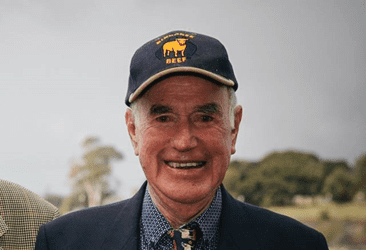Veteran NSW beef processor John ‘JR’ McDonald passed away on Tuesday, aged 86.
The founder of the Bindaree Beef processing business based out of Inverell in the state’s north, JR McDonald was active in the meat processing business across NSW for more than 60 years.

JR McDonald
Bindaree has grown today into one of Australia’s largest privately-owned meat businesses, employing around 1100 staff across processing, lotfeeding, value-adding and other divisions.
Although retired from the Bindaree business a few years ago, JR up until very recent times maintained a vital interest in the company’s fortunes, and the price of cattle on any given day.
Cutting his teeth trading cattle through the nearby Casino saleyards as a teenager, he became the largest service kill customer at one point at the Northern Cooperative Meat Co plant, before relocating to Sydney, where he worked in the processing line and export operations at his boning room at Homebush.
The original Bindaree Beef company, involving JR McDonald and John Newton, was formed 40 years ago, operating from a number of different sites before settling in its current location at Inverell in 1995.
A passage in Steve Martyn’s excellent processing industry history, ‘World on a Plate’ noted the rise to prominence in JR McDonald’s processing career:
The McDonalds had been active players in the domestic and export markets over many years, going back to the works at Wodonga, Victoria in the 1970s; Uki Meats (named after the small northern NSW town where JR spent time as a youngster) in Sydney; the Dubbo Council works before it closed in 1982; and the Lismore works, which the McDonalds bought and later sold to the Northern Cooperative Meat Co (so NCMC could close it).
In 1992, Bindaree purchased the TA Field/Metro Meat plant at Orange, and refurbished it at some expense. Orange never really moved to full production, however, finally closing in 2005.
Bindaree bought the mothballed Smorgon Inverell plant in 1995, investing heavily over the years in modernising and expanding the facility.
The Inverell business celebrated 25 years’ operations in December.
Bindaree purchased the Murgon (QLD) works from the failed South Burnett Meatworks Cooperative in 2000, lifting Bindaree at one point to number four on the list of Australia’s top 25 processors.
With the heavy regional competition from operators such as AMH, Teys and Nippon Meat Packers, Murgon closed and was ultimately sold as a non-processing site for hides prparation in 2005, with Bindaree consolidating its operations back to the Inverell facility.
JR was a person of strong opinions, who was prepared to share them, and argued his case with great vigour – whether it be industry affairs, regulatory matters, or mainstream politics.
Due to his ‘completely hands-on’ approach to the processing business, he commanded great respect and loyalty from his staff.
“He wanted to be in the boning room or down at the saleyards – there was no separation at management level – and people respected him for it,” a long standing work colleague told Beef Central this morning.
“He was completely hands on – that was his life – and he practised what he preached.”
JR frequently took strong, and often public stands on industry matters, especially the expenditure of levies and mechanisms like Meat Standards Australia, where he saw flaws or overly energetic bureaucracy in play. Originally a strong critic of the MSA program, he nevertheless embraced the system with gusto later in its evolution.
Non-packer meat exporter Richard Rains, the former head of Sanger Australia, did business with JR McDonald and Bindaree for well over 30 years – dating back well prior to the Inverell purchase. Both understood the principles of handshake deals, trust, and ‘win-win’ outcomes for both parties.
“We first traded with JR during his Sydney days, and out of Dubbo,” Mr Rains said. “Sanger was responsible for all beef sales from Bindaree’s Inverell turnoff, amounting to 1200 head of cattle, five days a week.”
JR McDonald could be a quite polarising character, Mr Rains admitted.
“He had strong political and agri-political views, but was always a man of his word. He argued his position with great passion and belief, and was always a great friend of the producer,” he said.
“JR played an important part in the beef industry, through both good times and tough times, and stayed the course. He was always incredibly hands-on, and was most comfortable inside the abattoir, not outside.”
“He had that innate ability to know the cattle market – when to buy cattle, when to hold back, or when to put a few away for later. He knew exactly where the profit was, on any given day.”
“There was nothing corporate whatsoever about JR – he had a real grassroots feel for the business, and the cattle market,” Mr Rains said.
JR McDonald is survived by his wife of more than 60 years, Norma, son Andrew, and daughters Tarnya, Leigh, Kerri and Tracey – most of whom worked in the Bindaree business at different stages. A private family service is planned, due to COVID restrictions.
